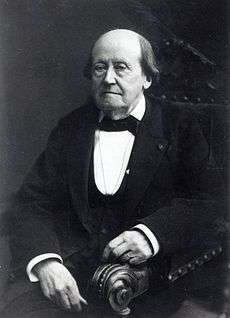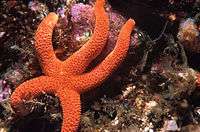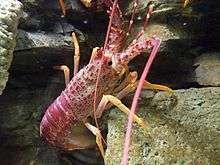Henri Milne-Edwards
| Henri Milne-Edwards | |
|---|---|
 | |
| Born |
23 October 1800 Bruges, French First Republic |
| Died |
29 July 1885 (aged 84) Paris, French Third Republic |
| Nationality | French |
| Fields | Zoology |
| Notable awards | Copley Medal (1856) |
Henri Milne-Edwards FRS FRSE (23 October 1800 – 29 July 1885) was an eminent French zoologist.
Biography
Henri Milne-Edwards was the 27th child of William Edwards, an English planter and colonel of the militia in Jamaica and Elisabeth Vaux, a Frenchwoman. Henri was born in Bruges, in present-day Belgium, where his parents had retired; Bruges was then a part of the newborn French Republic. His father had been jailed for several years for helping some Englishmen in their escape to their country. Henri spent most of his life in France. He was brought up in Paris by his older brother Guillaume Frederic Edwards (1777–1842), a distinguished physiologist and ethnologist. His father was released after the fall of Napoleon. The whole family then moved to Paris.
At first he turned his attention to medicine, in which he graduated as an MD at Paris in 1823. His passion for natural history soon prevailed, and he gave himself up to the study of the lower forms of animal life. He became a student of Georges Cuvier and befriended Jean Victoire Audouin.
He married Laura Trézel. They had nine children, including the biologist Alphonse Milne-Edwards.
Name
Originally the name Milne was one of the first names of Henri, but, to avoid confusion with his numerous relatives, he added it to his surname Edwards. He usually wrote it as "Milne Edwards", whilst his son Alphonse always used "Milne-Edwards". In taxon-authorship, the hyphenated name "Milne-Edwards" is most often used for both father and son.[1]
Works

One of his earliest papers (Recherches anatomiques sur les crustacés), which was presented to the French Academy of Sciences in 1829, formed the theme of an elaborate and eulogistic report by Cuvier in the following year. It embodied the results of two dredging expeditions undertaken by him and his friend Audouin during 1826 and 1828 in the neighbourhood of Granville, and was remarkable for clearly distinguishing the marine fauna of that portion of the French coast into four zones.
Also in 1829, working in the scientific field of herpetology, he described and named five new species of lizards.[2]
He became professor of hygiene and natural history in 1832 at the Collège Central des Arts et Manufactures. In 1841, after the death of Audouin, he succeeded him at the chair of entomology at the Muséum National d'Histoire Naturelle. In 1862 he succeeded Isidore Geoffroy Saint-Hilaire in the long-vacant chair of zoology.
Much of his original work was published in the Annales des sciences naturelles, with the editorship of which he was associated from 1834. Of his books may be mentioned the Histoire naturelle des Crustacés (3 vols., 1837–1841), which long remained a standard work; Histoire naturelle des coralliaires, published in 1858–1860, but begun many years before; Leçons sur la physiologie et l'anatomie comparée de l'homme et des animaux (1857–1881), in 14 volumes; and a little work on the elements of zoology, originally published in 1834, but subsequently remodelled, which enjoyed an enormous circulation.
In 1842, he was elected a foreign member of the Royal Society. The Royal Society in 1856 awarded him the Copley Medal in recognition of his zoological investigations. He died in Paris. His son, Alphonse Milne-Edwards (1835–1900), who became professor of ornithology at the museum in 1876, devoted himself especially to fossil birds and deep-sea exploration.
Honour
Henri Milne-Edwards



The name of Henri Milne-Edwards is honoured in several names of genera and species, such as:[1]
- Edwardsia de Quatrefages, 1841
- Edwardsiella Andres, 1883
- Henricia J. E. Gray, 1840
- Myrianida edwardsi (de Saint-Joseph, 1887)
- Lophoura edwardsi Kölliker, 1853
- Plesiopenaeus edwardsianus (Johnson, 1867)
- Plesionika edwardsii (Brandt, 1851)
- Dynamene edwardsi (Lucas, 1849)
- Grapsicepon edwardsi Giard & Bonnier, 1888
- Glossocephalus milneedwardsi Bovallius, 1887
- Onisimus edwardsii (Krøyer, 1846)
- Diastylis edwardsi (Krøyer, 1841)
- Neoamphitrite edwardsii (de Quatrefages, 1865)
- Colpaster edwardsi (Perrier, 1882)
- Milnesium Doyère, 1840
- Jasus edwardsii (Hutton, 1875)
- Odontozona edwardsi (Bouvier, 1908)
- Milneedwardsia Bourguignat, 1877
- Boeckosimus edwardsii (Krøyer, 1846)
- Lithophyllon edwardsi (Rosseau, 1850)
- Goniastria edwardsi Chevalier, 1971
- Fedora edwardsi Jullien, 1882
- Ciona edwardsi (Roule, 1886)
- Maasella edwardsi (de Lacaze-Duthiers, 1888)
- Forskalia edwardsi Kölliker, 1853
- Costa edwardsii (Roemer, 1838)
- Colobomatus edwardsi (Richiardi, 1876)
- Salmincola edwardsi (Olsson, 1869)
- Aristaeopsis edwardsianus (Johnson, 1867)
- Sergestes edwardsii Krøyer, 1855
- Odontozona edwardsi (Bouvier, 1908)
- Alphaeus edwardsii (Audouin, 1826)
- Ebalia edwardsii Costa, 1838
- Fedora edwardsi Jullien, 1882
- Teuchopora edwardsi (Jullien, 1882)
- Calliostoma milneedwardsi Locard, 1898
- Ocinebrina edwardsii Payraudeau, 1826
- Discodoris edwardsi Vayssière, 1902
- Tergipes edwardsii Nordmann, 1844
- Sadayoshia edwardsii (Miers, 1884)
- Periclimenes edwardsi (Paulson, 1875)
- Ocenebra edwardsi Payraudeau, 1826
- Conus milneedwardsi F. P. Jousseaume, 1894
- Montipora edwardsi Bernard, 1879
- Goniastrea edwardsi Chevalier, 1971
- Pagurus edwardsi (Dana, 1852)
- Chirostylus milneedwardsi (Henderson, 1885)
- Pisoides edwardsi Bell, 1835
- Cancer edwardsi Bell, 1835
- Haploblepharus edwardsii Voigt, 1832
- Diogenes edwardsii (de Haan, 1849)
- Propithecus edwardsi (A. Grandidier, 1871)
References
- 1 2 Hans G. Hansson. "Henri Milne-Edwards". Biographical Etymology of Marine Organism Names. Göteborgs Universitet. Retrieved August 28, 2010.
- ↑ The Reptile Database. www.reptile-database.org.
Bibliography
![]() Media related to Henri Milne-Edwards at Wikimedia Commons
Media related to Henri Milne-Edwards at Wikimedia Commons
- Marcelin Berthelot, Notice historique sur Henri Milne Edwards, Didot, Paris 1891.
- Trevor Norton: Stars beneath the sea, Carroll & Graf, New York 2000. ISBN 0-7867-0750-X